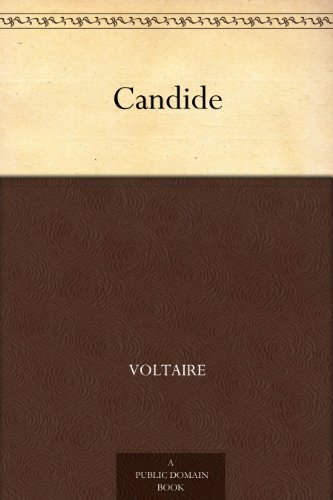All Nonfiction
- Bullying
- Books
- Academic
- Author Interviews
- Celebrity interviews
- College Articles
- College Essays
- Educator of the Year
- Heroes
- Interviews
- Memoir
- Personal Experience
- Sports
- Travel & Culture
All Opinions
- Bullying
- Current Events / Politics
- Discrimination
- Drugs / Alcohol / Smoking
- Entertainment / Celebrities
- Environment
- Love / Relationships
- Movies / Music / TV
- Pop Culture / Trends
- School / College
- Social Issues / Civics
- Spirituality / Religion
- Sports / Hobbies
All Hot Topics
- Bullying
- Community Service
- Environment
- Health
- Letters to the Editor
- Pride & Prejudice
- What Matters
- Back
Summer Guide
- Program Links
- Program Reviews
- Back
College Guide
- College Links
- College Reviews
- College Essays
- College Articles
- Back
Candide by Voltaire
Candide is a classic by Voltaire and a very good name dropper to sound philosophical. In theory a book written in the form of a fable/satire yet laughing at Leibniz's optimistic philosophy via the character of Dr Pangloss should be a hit, but left a boring aftertaste in my mouth.
It starts with Candide in the utmost comfort soon to be distorted by him being sent into exile from his uncle’s house due to his relations with the Barons daughter Cunegonde. Cunegonde is described as beautiful in the book, a real 'keeper'. As the story goes on it gets more and more silly.
Candide is reunited with the great philosopher Pangloss to then be put under the idea that he is hanged. This would make one presume that he dies, but never actually says so. Candide travels around, gaining and losing riches and good fortunes from page to page. He also stumbles across some interesting characters, old women, Cacambo and the unfairly treated Martin. Despite things getting worse, in the world and for Candide he keeps the same philosophy of 'Tout est pour le mieux dans le meilleur des mondes' translating to 'all is for the best in the best of all possible worlds'. As we all know in odd situations people choose to cling to things, be it god or a philosophy we can all empathies to a certain extent his obsession with optimism.
At the end of the book he is reunited with the great philsosopher, martin, cacambo, cunegonde, cunegondes brother who Candide tried to kill and the rest of their group. This is a predictable but nice ending as I personally grew rather attached to Candide! The last sentence is ‘That is very well put . . but we must cultivate our garden’ this means that there is no point caring about the big situations in the world, if you do not care for your friends and family that are right in front of you.
Similar Articles
JOIN THE DISCUSSION
This article has 0 comments.

